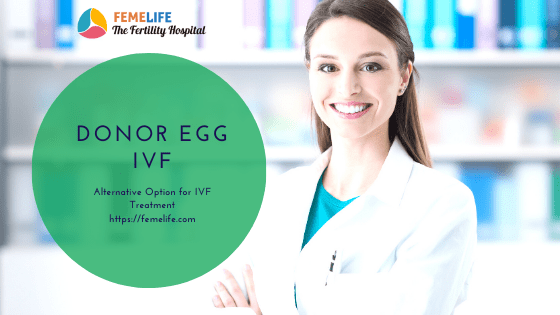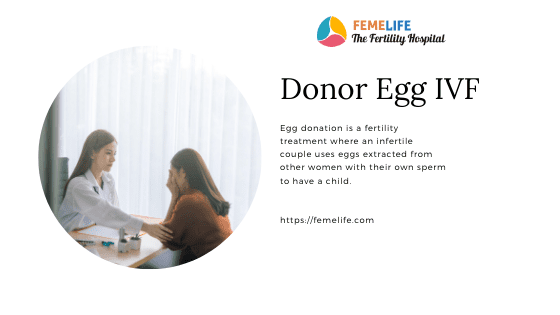
Donor Egg IVF – Excellent Success Rates
Since 1980s’ donor egg IVF is practiced and is a successful reproductive technology. Initially egg donation programme was not legalised, but at present many countries practice donor egg IVF with rules suitable to them. Egg donation is a fertility treatment where an infertile couple uses eggs extracted from other women with their own sperm to have a child. As a result, the woman who donates her eggs is known as the donor and is matched in appearances with the woman who receives called recipient.
Why Donor Egg IVF is advised?
Many couple fail to conceive with their own eggs in spite of trying repeatedly. Consequently, they are advised to go for donor egg IVF treatment by the fertility specialist. However, this may not be acceptable to you unless you know the science behind it. Your eggs are the reproductive units for a pregnancy. These eggs are required to fertilize with your partner’s sperm to form an embryo. Subsequently, the embryo implants in your uterus to carry on pregnancy and deliver a child. But this process may fail at times due to various reason. Some of the problems are
- 1) Age – Older women have low success due to poor egg quality.
- 2) Chromosome problems increase with age and hence you should plan your pregnancy when young.
- 3) Medical problems in the mother making her unfit to go for IVF treatment
- 4) Premature ovarian failure
- 5) Diseases which can get transmitted to the baby
- 6) Low ovarian reserve – after surgery or endometriosis
- 7) Same sex couples
How successful is IVF with donor eggs?
IVF treatment with donor is highly successful because the eggs are contributed by younger women with proved fertility capacity. In other words, if your partner’s sperm is of good quality it will form good embryos with the donor eggs. That is to say, you have great chance to achieve a pregnancy with eggs from a good donor.
Why does IVF with donor eggs fail?
In spite of using donor eggs at times, donor egg IVF fails. This may be due to
- Poor sperm quality -The DNA fragmentation rate is higher in male of advanced age or those who smoke. Subsequently, low sperm quality can decrease the success of assisted reproductive techniques (ART) due to abnormalities in DNA.
- Implantation failure – Inadequate uterine receptivity, is responsible for approximately two-thirds of implantation failures, whereas the embryo itself is responsible for only one-third of these failures. Hence for implantation both embryo and uterine lining are important.
- Age of recipient – Abnormal uterine anatomy, non-receptive endometrium and the medical condition of the mother also can affect the implantation process. These factors can worsen with advanced age. Most importantly, advanced age can cause changes in your egg quality.
- Thin Uterine lining – Your endometrial thickness is important for successful implantation. The minimal adequate endometrial thickness for successful implantation varies between range of 6–8 mm.
- Decreased Egg quality – A chromosomal normal egg has 23 chromosomes and when fertilised. The sperm, which also has 23 chromosomes results a healthy embryo with a good quality egg. When your donor yields eggs of poor quality the resulting embryo may not be good to implant.
- Problems with IVF process and laboratory techniques – IVF involves series of procedure meticulous techniques at each step is important. Hence quality control in a laboratory is more important for success of IVF treatment. You must choose a IVF centre with expertise and good track record for success.
- Blood clotting disorders like thrombophilia – Disturbed blood flow can, on one hand, hamper normal endometrial receptivity and, on the other, cause miscarriage. Your fertility specialist will check for any such disoder if you are experiencing repeated IVF failure.
How much it costs for IVF with donor eggs?
The cost of egg donation can be variable at different places. The average cost range is based on services, fees and medical expenses. That is to say, this range includes egg donor compensation, egg donor program fees, the donor egg, IVF costs and fertility treatments and pricing for legal documents, travel and other expenses. Getting donors across the border to match the racial needs will cost more.

Is there any difference in using fresh or frozen eggs?
There is a slightly higher chance of a live birth from a fresh donor egg compared to a frozen donor egg. So, fresh eggs can result in a live birth around 60% of the time while frozen eggs give success in 40% cases. Using fresh donor eggs means you and your donor will have to regularise menstrual cycles with hormone injections.To sum up, your donor will have her egg retrieval when your uterus is ready to receive the embryos created from the donor egg and your partner’s sperm. As a result, using frozen eggs from an egg bank, means your donor eggs are ready and there’s no need to prepare your cycle with your donor’s. So, Donor egg IVF requires more expertise in synchronising both the donor and recipient.
How do I choose a donor egg?
Donors are matched usually according to the skin colour, eye colour, race, blood group and hair colour. They are matched to the height as well. In conclusion, donor is choose according to the patient profile so that the baby looks like the biological parents.